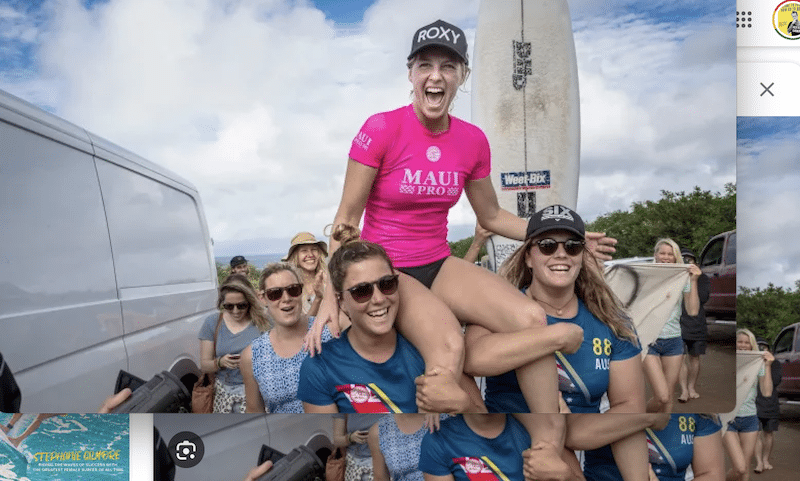
“More than results, I want to be remembered for the performances that evoke emotion and that leave a mark.”
Six years ago, I sat in a rented campervan parked in the driveway of a Ventura, California beach house.
Across the table sat Carissa Moore, then a three-time world champion. I was there to interview her for what became a cover story at Red Bull’s print magazine.
Late in the interview, I asked the kind of routine question that sometimes leads somewhere interesting, but just as often does not. “Where would you like to be in five years?” I asked.
Twenty-five at the time, Carissa Moore wasn’t sure what her life might look like five years in the future.
“I’ll be 30 then,” she said. “I would definitely like to be still surfing.”
She’d recently started her Moore Aloha non-profit for girls and imagined starting a family. “Maybe I’d take a year off and come back on Tour as a mom. It would be pretty cool if that’s even possible.”
Now 31, Carissa Moore is definitely still surfing. But what surfing looks like to her and how it fits into the broader patterns of her life is now set to change dramatically.
Early this morning in a wide-ranging interview published at the New York Times, Carissa Moore confirmed that she will end her competitive surfing career this summer.
The five-time world champion and Olympic gold medalist plans to surf the upcoming Lexus Pipe Pro and the 2024 Olympic Games. Then she will turn to new pursuits and to a life no longer counted out in 30-minute heats and measured in judges’ scores.
“All those wins, the competitive part that’s so much of my identity, I’m taking that away, and I’m facing myself this year,” Carissa told the New York Times. “And that’s scary. Like, who am I?”
Born in Honolulu, Carissa learned to surf at Queens in the shadow of Diamondhead at the age of 5.
Each day, she walked past the statue of Olympic swimming champion Duke Kahanamoku on her way to surf.
When Carissa Moore was 10, her parents divorced and she divided her time between her two parents, only surfing with her dad Chris Moore.
Together Carissa and Chris, a ocean swimmer and body surfer built her career, which at times made for a fraught relationship between them.
By age 12, Carissa Moore had committed to surfing as a career and a singular ambition.
From the start, Carissa’s talent stood out. She brought a speed and progressive approach to her surfing that prompted comparisons to Kelly Slater and Dane Reynolds. Together with surfers like Malia Manuel, Coco Ho, and Lakey Peterson, Carissa brought a new approach to women’s surfing. “It went from a lot of you know, cutbacks and things like that, to blowing the tail,” says Jason Kenworthy, who directed the film, Leave A Message. “That was pretty instant.” Early clips of a teenaged Carissa show carving 360’s and tight, vertical turns.
Her competitive career took off with dizzying speed. While still in high school, Carissa qualified for the Championship Tour, and in her first year on Tour at age 17, she won two CT events and finished third overall. The following year in 2011, she won her first world title.
Behind the scenes, the stresses of her personal life and the weight of her own expectations led Carissa Moore to struggle with eating disorders. The culture of surfing at the time didn’t help with its emphasis on bikini babes and butt shots. It took time for Carissa to feel comfortable in her own skin and to find herself amidst the pressures of her fast-moving professional career.
Despite her inner turmoil, Carissa continued to push herself and her sport. Between 2011 and 2015, Carissa and Stephanie Gilmore traded world titles in a smiling, yet fierce rivalry. At times, they seemed to pull women’s surfing in opposite directions with Steph’s smooth grace standing in contrast with Carissa’s intensity, strength, and progression. Steph will now retain the upper hand in the world title count, but that was never the goal for Carissa. “I didn’t go into it thinking I wanted to win ten world titles,” Carissa told me back in 2018.
A four year gap between world titles tested Carissa’s determination.
She considered quitting competition, but believed she had more to give. In the meantime, her marriage to Luke Untermann in December 2017 brought a new stability to her life and with it a greater resilience. Even the most successful contest surfers lose more heats than they win. For a surfer as demanding of herself as Carissa, those losses have often hit hard. It’s taken much of her career to learn how to ride that rollercoaster while retaining her equilibrium.
“I have unconditional love,” she told me in 2022. “I’m going to go out there and I’m going to surf my hardest. I’m going to surf my heart out. And then I’m going to let it go. I just want to know that I put it all out there. That’s all I can ask of myself. And if I do that, I’ll be okay, regardless.”
As Carissa won two more world titles in 2019 and 2021, she continued to evolve her surfing. At Newcastle in 2021, she landed one of her first significant airs in competition. “That was a big one for me,” she said. “It’s definitely something I’ve been trying to work towards my whole career and I’ve done like little airs and stuff — but that one actually felt like it was a legit one.” When the World Surf League added Pipeline and Teahupo’o to the women’s schedule, Carissa pushed past her fears and put her full attention on her backside barrel surfing. Carissa has never been content to stand still.
“She’s always learning and evolving,” said Duncan Scott, who has coached Carissa over the years at J-Bay. “What’s incredible is that Carissa has five world titles and when you watch her surfing, it’s still evolving and you’re like, ‘shit, she’s still just getting started.’”
The highpoint of Carissa’s career came in 2021 when she won Olympic Gold and the world title in the same year. Ahead of the Olympics, she wondered how it could be bigger than winning a world title. “It definitely felt bigger because of the prestige of the Olympics and the Games,” she said. “It really does stand for something more than sport.” The experience also brought Carissa more in touch with her Hawaiian roots and affter winning Gold, she returned to Queens and hung her leis on the statue of Kahanamoku.
In the short run, Carissa still has three big contests ahead of her. She’ll compete at home in Hawai’i at Pipeline, where she won in small waves in 2023. Carissa has chipped away at Pipe, slowing building her skills. She’s taking off deeper and in bigger waves now and has, improved her body position in the barrel. Certainly, she’d love to go out with a win in good waves at Pipe in front of her friends and family.
Then it’s on to the fearsome Teahupo’o for the Olympic Games. In Tahiti, she’ll face strong competition from local girl Vahine Fierro. Few athletes get to choose their endings, but a second Olympic medal would be a beautiful end to Carissa’s competitive career.
To look only at her results is to sell Carissa short.
More than many athletes, she’s set out self-consciously and intentionally to serve as a role model to younger girls. Her Moore Aloha non-profit has grown to include clinics, essay contests, and international exchanges. During her early career, she did a photo session for the ESPN Body Issue, but later asked that the photos not be published. It wasn’t that she didn’t like them. In fact, she’s said that she felt beautiful in the images. It simply wasn’t the example she wanted to set.
“I know the kinds of values that I want to share with the next generation and I know the kinds of feelings that I want to leave with people,” she said. “And I’m always going to stay true to that.”
How Carissa Moore pieces together her life after competition remains an open question.
BeachGrit has confirmed that Carissa has a full-length film project in the works.
It’ll be a joy to see how her surfing unfolds outside the constraints of heats and judging criteria. There’s a whole world of waves out there for her to explore and to surf in her own way, purely as a form of self-expression. It will be exciting to see what that looks like. And, there’s that prediction she made six years ago about starting a family. Now at last, she’ll have the time for the rest of her life.
One thing’s for sure: Carissa Moore’s legacy in surfing is secure.
She readily stands among the best ever to do it and has shoved the boundaries of women’s surfing outward. And, along the way, she’s pushed herself, too. Somehow, Carissa has remained a uniquely human champion, which makes the whole thing all the more inspiring. She’s set a high bar for herself, and I’m not sure she’ll ever stop reaching higher, whatever she chooses to do with her next chapter.
“I think more than results, I want to be remembered for the performances that evoke emotion and that leave a mark,” she said. “I want someone to look back and be like, ‘Carissa was one of the women to push the level, to get above the lip, and to do things that were more creative. And, she surfed with this flair and this pizazz and with this style that is timeless.’”





